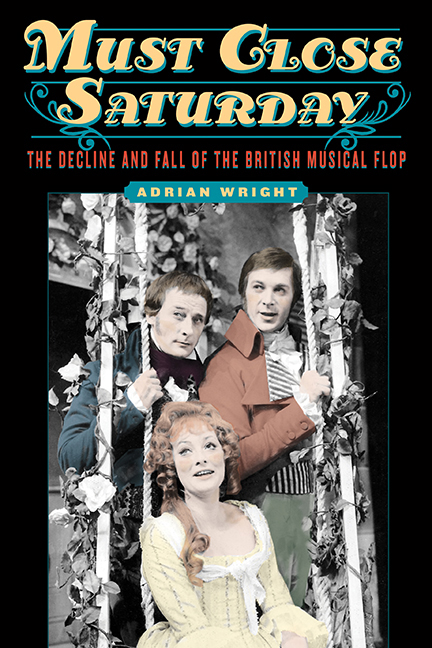Book contents
- Frontmatter
- Contents
- List of Illustrations
- Preface and Acknowledgements
- 1960
- 1961–1964
- 1965–1966
- 1967–1969
- 1970–1972
- 1973–1976
- 1977–1979
- 1980–1983
- 1984–1989
- 1990–1999
- 2000–2005
- 2006–2016
- Appendix: British Musical Flops in London 1960–2016
- Notes to the Text
- Select Bibliography
- Index of Musical Works
- General Index
- Frontmatter
- Contents
- List of Illustrations
- Preface and Acknowledgements
- 1960
- 1961–1964
- 1965–1966
- 1967–1969
- 1970–1972
- 1973–1976
- 1977–1979
- 1980–1983
- 1984–1989
- 1990–1999
- 2000–2005
- 2006–2016
- Appendix: British Musical Flops in London 1960–2016
- Notes to the Text
- Select Bibliography
- Index of Musical Works
- General Index
Summary
‘This musical tribute to the musical Martians in our midst sets a new standard for idiocy’
The Times on On the Level1965: The Wayward Way Divorce Me, Darling! Four Thousand Brass Halfpennies Passion Flower Hotel Twang!
The West End was never the right milieu for The Wayward Way (Vaudeville Theatre, 27 January 1965; 36), an American musicalisation of the nineteenth-century temperance melodrama The Drunkard. Shaftesbury Avenue was no place for theatrical trinkets. The Wayward Way had already played Los Angeles for six years, but never chanced Broadway; its non-musical predecessor had played LA for twenty years, making it a sort of US compatriot of The Mousetrap. Lightly dotted with songs by composer Lorne Huycke and lyricist Bill Howe that had no hope of lasting beyond the exit doors, the British production of The Wayward Way, presented by Tommy Duggan, had a season at the Lyric, Hammersmith before its London opening. It was artfully cast, with Jim Dale and David Holliday, late of Sail Away and No Strings, as leading men, playing opposite innocent heroine Roberta D'Esti. Deranged Mad Agnes was played by Cheryl Kennedy, with one of the best lyrics of the evening: ‘Why do they call me dotty when Agnes is my name?’ In the shadow of the greatest British stage villain of all time – who else but the inimitable Tod Slaughter?1 – John Gower's Squire Cribbs had little to offer but a deep voice, but elsewhere the trifling felicities of the piece worked well enough, if overplaying was wanted. With the evening's tract against the consequent social evils of drink packed away, the second half was given over to an ‘Olio’, a series of vaudevillian turns reminiscent of a revue night at the Players’ Theatre in Charing Cross.
There remained the question of style. Should the primped-up Victorian drama be played straight or served up as warmed-up cod, blatantly mocked or gently parodied or done straight-faced? Answer came there none, so much nonsense already having been written about how other shows dealt with a similar problem of period style (The Boy Friend aping the 1920s or Little Mary Sunshine aping American operetta).
- Type
- Chapter
- Information
- Must Close SaturdayThe Decline and Fall of the British Musical Flop, pp. 40 - 61Publisher: Boydell & BrewerPrint publication year: 2017

